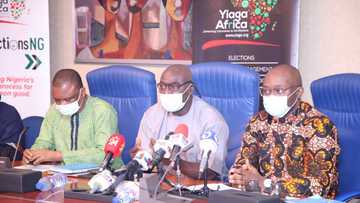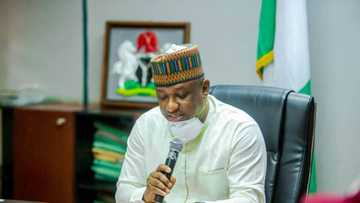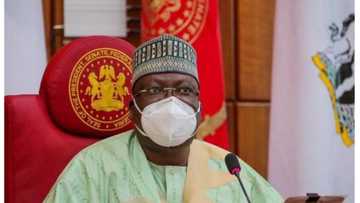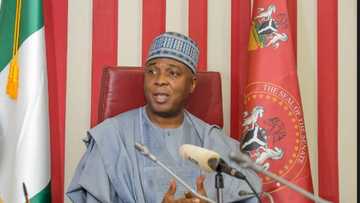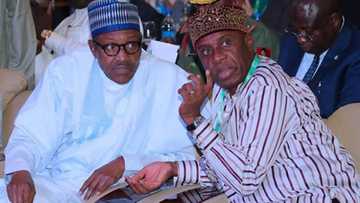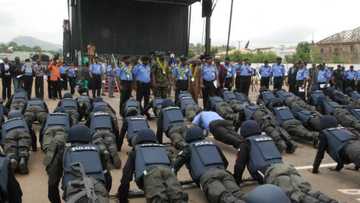Basic Healthcare Provision Fund: Nigeria Health Watch Organises Town Hall Meeting in Dukpa
- Nigeria's Basic Health Care Provision Fund (BHCPF) has the potential to allow for more equitable and efficient health care financing
- There are, however, concerns to ensure accountability between the different stakeholders responsible for implementing the BHCPF at national, state, local and facility levels
- Nigeria Health Watch is doing its own part to ensure that a community in the outskirts of Abuja gets what it deserves from the BHCPF
FCT, Abuja - Dukpa, a community in Gwagwalada Area Council of the Federal Capital Territory (FCT), Abuja came alive on Monday, December 12 as a town hall meeting organised by the Nigeria Health Watch gave the residents an opportunity to interact with government officials in charge of the Basic Healthcare Provision Fund (BHCPF).
The BHCPF is a federal and state-funded initiative that is a component of the National Health Act of 2014, which called for better investment within the Nigerian health sector. It was signed into the 2019 fiscal budget by President Muhammadu Buhari in 2018.

Read also
Nigerian Govt excited as it finally secures N287.6bn loan after months of negotiation with World Bank

Source: Facebook
The BHCPF is predominantly financed through an annual grant from the federal government of not less than one per cent of the Consolidated Revenue Fund (total federal revenue before it is shared to all tiers of government).
In commemoration of the 2021 Universal Health Coverage Day 2021 with the theme: "Leave no one's health behind: Invest in health systems for all," the Nigeria Health Watch organised a townhall engagement meeting in Dukpa Primary Health Centre to discuss specifics concerning BHCPF and gauge how the community has benefitted from the programme.
Do you have a groundbreaking story you would like us to publish? Please reach us through info@corp.legit.ng!
Dr Basheer Abubakar, a health journalist with the Nigeria Health Watch team, noted that:
“The whole essence of this community town hall engagement meeting is to understand the experience of community members, how they are accessing healthcare, especially under the basic healthcare provision fund that was passed a few years ago.
“Dukpa community has a primary healthcare centre that is one of the 62 health facilities under the federal capital territory that is receiving funds under the basic healthcare provision fund.
“So, we are here to understand the experience of the community members. What has that fund done for them? What impact has it had in their lives? What changes has the fund brought to the health facility? That is the whole essence of organising the meeting.”

Source: Facebook
Indeed, the Nigeria Health Watch team stirred very honest conversations in the sleepy community with the town hall meeting.
A resident, Mahmud Danjuma stated that the Dukpa primary healthcare centre has been beneficial to the people, but noted that the facility needs a fence and water.
According to him, the healthcare centre cannot operate for 24 hours because it has no fence to secure workers at night, adding that they also need a borehole for water.

Source: Facebook
For Sadiya Mohammed, a nursing mother, the basic healthcare provision fund has been a blessing to her.
She said:
“A few months ago when my child was sick. I took him to the primary healthcare centre and we were given cards. Since then, he has been getting free treatment.”
On her part, another resident, Yohanna Ibrahim, said when she was pregnant, she accessed free healthcare from the centre from the ante-natal stage till after she gave birth. She added that her baby also receives free healthcare at the centre.
Interestingly, some of the residents of Dukpa community say they have not heard of the programme before the Nigeria Health Watch town hall meeting.

Source: Facebook
Asked if they did enough awareness to ensure people are aware of the basic healthcare provision fund, the director of health, Gwagwalada Area Council, Dr Adeyemi Adeniran said:
“Maybe it has not been enough, but we have tried our best. We have had town hall meetings. They have been coming. At the last minute, we discussed enrolments, more people are coming and are interested. For each facility, none is less than 1,000 across board. We are doing well.
When asked if the idea of selecting one healthcare centre in a particular ward is not seen as disenfranchising some others, Dr Adeniran said:
“That is a problem. We have 10 wards in Gwagwalada and 10 facilities across Gwagwalada Area Council. It has resulted in drifting in the influx of patients.
“Some people will leave their own ward and go to another ward to enjoy the services. We're addressing that. Because the programme is still spreading and expanding. That will be addressed over time.”

Source: Facebook
He, however, noted that despite the challenges, the basic healthcare provision fund is achieving a lot and meeting the healthcare needs of the people.
His words:
“Across board, we have achieved a lot. We came through a lot of very hectic preparations over months from the national to the state to the local government.
“We had to develop what we call quality view plan and business plan which is what we have been using to facilitate the activities at the grassroots level.
“Basic healthcare fund is not working directly with Universal Health Coverage through FCT insurance. Those are the gateways the national and state health insurance gets money from.
“Coming down to the grassroots, through the quality view plan, to improve the standards of treatment, including infrastructure, we had to put in the budget, which is the business plan.
“Every quarter, we get some money, we focus on under 5, pregnant women, and the aged people from 65 and above for free treatment. So, the primary health care centres get the money and buy their drugs.
“We also have other thematic areas, including infrastructure and employment. If the primary health care centre needs a cleaner, they don't have to wait for the government, from that money, they can employ a cleaner and pay him or her.”
Sharing his experience, Dr Timzing Auta Wuyep, the officer-in-charge at Dukpa primary healthcare centre, said the programme is commendable, but lamented that regular funding remains a challenge.
Wuyep who has been in charge of the centre for over 12 years said:
“The basic healthcare fund is a very good initiative especially for the vulnerable in the society, young and aged people. We used the money to pay their debts in the hospital.
“When money started coming, we used the money to pay their debts in the hospital. We started receiving the money in 2020. Firstly, they gave us N600,000. Out of it, we produced our cards, we bought anti-malaria drugs, test kits.
“When a patient comes, he or she undergoes a test, if it is malaria positive, we treat it with the malaria drugs we bought. But when it is a higher ailment, we refer them (to a better government hospital).”

Source: Facebook
On the challenges faced, he said:
“Funding is not coming in regularly. If it is coming regularly as it is supposed to come, we would be making more progress. The one we have now, if we utilise it before January, and we don't get another one, the drugs will finish. We have to wait until they bring another fund.”
At the end of the town hall, the Nigeria Health Watch team was able to get a commitment from officials of the Gwagwalada Area Council to address the issues raised by the community members.
Participants at the town hall also praised the Nigeria Health Watch for the initiative, noting that such meetings should be held frequently.
Source: Legit.ng


